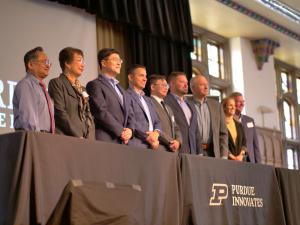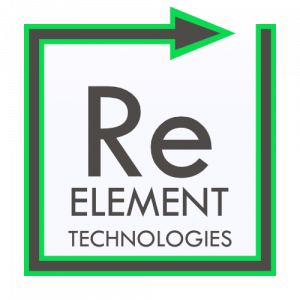ReElement Expands Its Exclusive Rights for Rare Earth Element Purification Technology to Include All Feedstocks
Purdue University has expanded ReElement’s exclusive rights to include all feedstocks including rare earth ores
American Resources Corporation (NASDAQ:AREC)
... We have expanded the worldwide exclusive rights to include all feedstocks for our separation and purification patents for critical and rare earth elements. ”
FISHERS, INDIANA, UNITED STATES, April 19, 2024 /EINPresswire.com/ -- American Resources Corporation’s (NASDAQ:AREC) (“American Resources” or the “Company”) wholly owned subsidiary, ReElement Technologies Corporation, (“ReElement”) a leading provider of high performance refining capacity of rare earth and critical battery elements, announced today that Purdue University has expanded ReElement’s exclusive use of the patents for licensed ligand assisted displacement (“LAD”) chromatography and knowhow for all feedstocks to now include rare earth ores. These exclusive patents and technologies, developed at Purdue University, have been utilized by ReElement at its Noblesville, Indiana Commercial Qualification Facility to produce ultra-pure rare earth oxides and critical battery elements to the growing magnet and energy storage industries. ReElement has successfully developed its critical mineral platform technology providing a high performance and scalable solution for separating, purifying and refining rare earth and critical elements in an efficient, low cost and environmentally safe process outside of China. — Mark Jensen
Mark Jensen, CEO of ReElement Technologies said, “I am thankful for the hard work of our team as well as our partners at Purdue University. Based on our rapid execution and success to date, we have expanded the worldwide exclusive rights to include all feedstocks for our separation and purification patents for critical and rare earth elements. This expansion of rare earth elements from primary feedstocks will now complement and work alongside our existing worldwide exclusive rights for recycled rare earth feedstocks and all critical battery mineral feedstocks. As we embark on the next few years, we look forward to working with partners that we can collaborate with to efficiently synthesize upstream and downstream parts of the supply chain with our efficient and essential refining solutions to enable a healthy, secure and sustainable supply chain for critical and rare earth minerals in the United States and across the globe. The demand for critical and rare earth elements is projected to grow due to the energy transition towards cleaner, electrified products and technical performance in both commercial and national security related industries. We couldn’t be here without the hard work and efforts of Dr. Linda Wang and the support she has been provided by the Purdue University team. We are extremely grateful and honored to work alongside her to innovate this critical industry.”
Ben Wrightsman, President of ReElement added, “Even secondary uses and refining of rare earth elements depend on China. Rare earths are utilized globally, and yet nearly all roads lead from, through and back to China. It is imperative that we ensure a global ecosystem and establish independent versus limited-source, single-dependent, refining supply chains, and this partnership and technology deployment with Purdue will ensure the U.S. can gain a necessary independence for rare earths and critical minerals.”
Dr. Nien-Hwa “Linda” Wang, The Norman and Jane Li Professor at Purdue University’s Davidson School of Chemical Engineering commented, “My students and I are thrilled that ReElement Technologies is bringing this method to separate and purify rare earth and battery elements to the market. Its impact will be felt not only by industry but by people who care about the environment. There have been a lot of people who have worked with me, from the College of Engineering to the Purdue Innovates Office of Technology Commercialization, to funders at the state and federal level. Developing this technology has taken many years, but it is ready for the next giant leap of commercialization.”
Brooke Beier, Senior Vice President at Purdue Innovates added, “The success story of ReElement commercializing Purdue-discovered technology is another example of how Purdue Innovates supports university researchers, industry and efforts to strengthen our national security. Our team worked with the lead inventor, Linda Wang, to vet and protect her intellectual property and worked with ReElement leadership to bring it to market and impact the state of Indiana’s economic development with new jobs.”
Dan Hasler, Founder and President of Hasler Ventures LLC stated, “Our economy and national security are totally dependent on separated and purified rare earth metals nearly solely produced in China. We’ve got to get serious about creating a domestic supply chain that ends with final high purity product, and this technology looks to be the enabler.”
ReElement is currently evaluating or in conversations with providers of rare earth ores from four different continents with the goal of either partnering with such parties or acquiring their rare earth concentrates to be refined domestically. Rare earth elements (REEs) include the 15 elements in the lanthanide series plus scandium (Sc) and yttrium (Y). They are essential ingredients for high-end commercial and national defense applications in magnets, metal alloys, catalysts, ceramics, and phosphors, which are important for high-technology and clean energy applications. The REE market was valued at $5.37 billion in 2022 and is expected to reach $14.24 billion by the end of the 2030.
Ligand Assisted Displacement (“LAD”) Chromatographic Separation and Purification
The use of LAD chromatography to separate, purify and refine rare earth and critical elements is the most cost effective and environmentally safest methods utilized to date. LAD chromatography, as designed for rare earth element extraction and purification, is a much cleaner and greener purification process compared to conventional solvent-based extraction methods. It has a higher yield, productivity, flexibility and efficiency allowing for smaller and scalable processing volume without the harsh or toxic chemicals.
The technology enables:
• Modular and scalable production capacity (growing processing volumes efficiently as feedstock production expands);
• Localization of processing (Removing the need to transport raw ore across the world);
• Significantly less chemical and energy use; and
• Versatility of technology for multiple feedstocks (ores, recycled material, etc.).
David Sauve
ReElement Technologies LLC
email us here
Visit us on social media:
Facebook
Twitter
LinkedIn
Instagram
YouTube
Legal Disclaimer:
EIN Presswire provides this news content "as is" without warranty of any kind. We do not accept any responsibility or liability for the accuracy, content, images, videos, licenses, completeness, legality, or reliability of the information contained in this article. If you have any complaints or copyright issues related to this article, kindly contact the author above.


